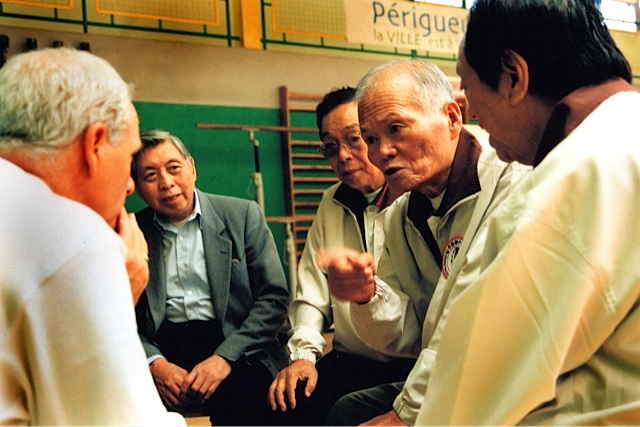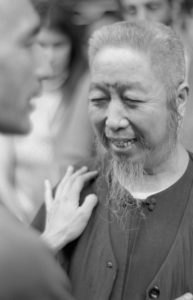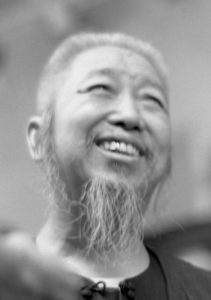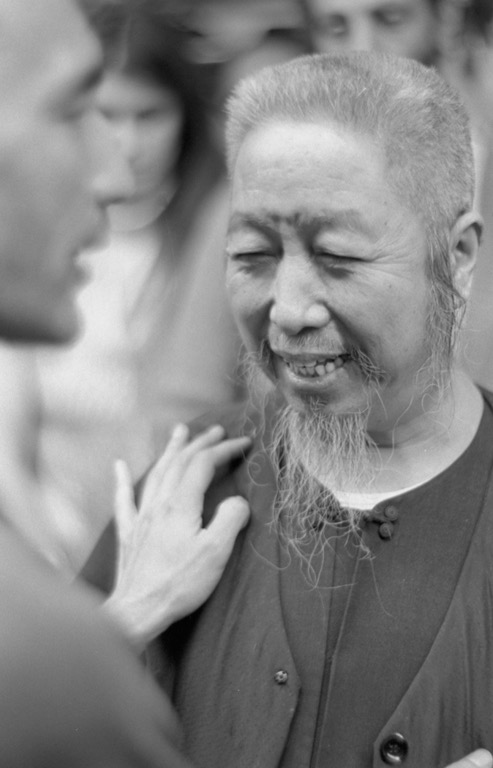Conversations with the Grandmasters
During the course of the Cheng Man Ching Forum 2002 I wanted to arrange interviews with the special guests who were the lineaged Grandmasters that had been very close students of Professor Cheng Man Ching. The Gentlemen concerned were: William C C Chen, Benjamin Lo, Hsu Yee Chung and Hung Ping Chu. As they were attending the event as honoured guests it proved very difficult to find the quiet space that would provide the desired conviviality for our conversations. We did, however, manage to find a spare half hour where went to the back of the hall where the competition was taking place. Two of the Grandmasters required translations (via William C C Chen and Benjamin Lo. I recorded the conversations amid the cheering and general noise of the competition which made it difficult to really catch all that was being said, and even who said exactly what. I do hope, however, that the end result proves to be interesting to the reader.

My thanks for their invaluable assistance go to my good friend and colleague, Bob Lowey for the renewed contact with William C C Chen (which, in turn included the other Grandmasters) and particular thanks to Epi van de Pol (who originally introduced Bob to William C C Chen, who he had known since 1979 & Ben Lo, whom he had met some 20 years earlier) for making the conversations not only possible, but as relaxed and as open as they could be, under the very difficult circumstances.
Perhaps a good place for us to begin is to look at what made you, obviously very busy gentlemen, take the time and trouble to travel such a great and arduous distance to attend this event.
Ben Lo: Actually it’s very simple; we just wanted to help people to spread our style of Tai Chi Chuan. We try to help to spread it across the whole world, but we are only a few in number, so we feel it is important to attend such an event, that brings so many practitioners of this style together.
I come from the United States and I know that so many people in the US have problems with the health care system because it costs so much money, and I’m sure it’s the same situation in many other countries too. By practising Tai Chi Chuan people can become very healthy, live a longer and happier life and also reduce the costs of the health care budgets.
Hsu Yee Chung: Tai Chi can improve your health, prevent illness and can also be a good system of self defence, so it is important that we come to an event like this to help to promote the art.
Ben Lo: A lot of people practice meditation. Tai Chi is also a very good system of moving meditation which can also change your temperament. If you are hot tempered, you won’t be able to do the slow, meditative movements well, but by practising in this way you can change your temperament. By doing this one thing many results can be achieved.
We have all been here for around 3 – 4 hours today and we’ve seen many interpretations of the style which we all practice. We call it the Cheng Man Ching style but there seems to be so, so many variations, I’m interested to know what you feel about this?
Ben Lo: Frankly, if we learn it from the Professor, then everybody should follow his way.
But they don’t do they?

Ben Lo: No they don’t. The reason why is because people are different. If you learn a painting from one teacher and have several classmates learning at the same time, then there will always be differences. Generally the spirit is the same but there are always differences. Everybody’s character is different. Some people may do it a little higher, some a little lower but that doesn’t really matter, the main thing is the principle. You have to follow the principles. You have to emphasis relaxation, if you use force, then that’s completely wrong. It’s not only what’s going on in the outside. You know Tai Chi is an internal school and you have to pay attention to what’s going on in the inside too. In the beginning you have to learn from the outside to the inside.
Hsu Yee Chung: If the family have 10 children, then they all do things differently, but the principles are still the same. Things like relaxation should still be the same. There are no differences in the way people are practising as long as they follow the main principles. Nowadays we think about how Tai Chi can make you healthier and more good-natured.
Hung Ping Chu: It’s down to two things, the student and the teacher. The teacher may want to teach it really well and the student may want to learn it really well but the IQ can be different and he may not have the ability to learn it well. The opposite can also be true.
Ben Lo: In the old days they talked about secrets, but today nothing is secret. People always ask me, “What’s the secret?” I say. “Relax.” They may not really know the meaning of the word relax. Not only do they have to understand what it means, but they also have to show it, in what they do.
Hsu Yee Chung: Many things can happen with the teaching of the form: where the attention is placed in the learning and what aspects are most focussed on. Professor Cheng taught things in a very particular way but it’s not only the learning of the form that we have to consider but also the whole attitude of the teacher and the students. Tai Chi has made us all very strong and healthy. William is 60, Ben is 76, I am 81 and Chu is 86. In the Cheng Man Ching style sometimes it’s not so clear what is going on. In other styles it seems clearer that this is here, and it’s doing this, and this is here, doing that, but it’s not often the case in this system. Ben Lo: (getting animated) Excuse me for interrupting. Can you show me which parts aren’t clear? What style do you do? How long have you been practising?
Well the reason that I’m so interested is that when I started doing Tai Chi 22 years ago, my teacher told me that we were learning Chen Man Ching style. Now I’m not so sure that what I do can really be called the Chen Man Ching style.
Ben Lo: Who was your teacher?
Well I worked with someone in the UK who was taught by John Kells and Dr Chi Chiang Tao.
Ben Lo: Dr Chi I know, he was a classmate of mine. You’re right to say that. I’ll tell you one simple way. If you really want to know that what you’re doing is right then study Professor Cheng’s videos. We’re very lucky to have a visual record of his work that you can refer to. If I say that I learn from you but my posture is different from yours, what do you think? It can’t be right. Yes, but what you see in the video is only the external shape and form. You can’t really see what is going on.
Ben Lo: Yes you’re right, inside there’s no way to see. For the inside we have to talk about it, not only talk, but you have to practice. Not only practice, but practice long and hard, and this is why only very few people can really do it well.
Epi van de Pol: I would like to ask all four of you what Professor Cheng stressed to be the main internal principle.
Ben Lo: Relax.
Hsu Yee Chung: Sung
Ben Lo: It’s easy to talk. One second you may understand Sung but perhaps for the rest of your life you don’t. You have to practice and practice very, very hard.
So what should we practice? We practice the form, Tui Shou, weapons …?
Ben Lo: The form is the first. If I want to learn a language I have to begin with the basic structure. It’s like doing calligraphy. You do a character and 10 years later you do the same character and look at it, you will see very different things. It is an art. There are no limits; it’s developing all the time. We can’t say if we are good or not, we just do it. Who dares to say, “I am good.”
Hsu Yee Chung: You have ‘Sung’ and ‘Chen’, ‘Chen’ means ‘sink’. You need to have both aspects and once you have these you are healthy. I believe that Tai Chi helps the blood circulation and the Qi flow which helps you to live a long life and be healthy.
William C C Chen: What I say is that besides ‘Sung’ you should also ‘let go.’
Epi van de Pol: How was it to do push hands with Professor Cheng?
Ben Lo: I can’t describe it because you never saw it. Sometimes you watch people do push hands you don’t see anything. Only when you touch them do you find it. I have the videos but you can’t see it. You see someone bouncing and it looks like it’s fake. How can you describe it, you can’t. You touch the Professor and then you’ll know. Maybe you’ve had the experience when you touch power you feel a shock. When the Professor discharged energy it felt just like that.
How do you think the Professor would like to see the Tui Shou competitions that are happening here right now? How would he feel about it?
Ben Lo: We don’t do competitions; we just reach for each other. This is a modern way, not a Chinese way.
How do you feel about it?
Ben Lo: It’s good, If you follow the rules. At least it’s better than boxing right? Do you see anybody bleeding or losing teeth? No. We do Tai Chi mainly for health today and to keep everybody healthy and to live longer. Enjoy your life. The martial art part is not so important today. It was more important in the old days. We think about the principles of stick and follow, but sometimes they’re against it. We want to neutralise.
Hsu Yee Chung: If the Professor looked at these competitions he would be very disappointed.
William C C Chen: Without this kind of push hands you can never go to a higher level. It’s good to have the experience to help you to develop further.
Hung Ping Chu: They should be exercising the principles of stick, follow, yielding and neutralise and that doesn’t seem to be so evident here.
You’ve all said, and I think you all agree that the priority for Tai Chi is health. What would the purpose of Tui Shou be with respect to health?
Ben Lo: Push Hands is a training exercise which helps you to understand the principles. It can also be a bridge to training for fighting. If you just practice the form you may think that you are relaxed but in push hands you can get a better idea if you are relaxed or not. In the US I teach classes for the elderly and I don’t teach them push hands. They just do the form for the health benefits.
But do you not feel that by practising Push Hands students can get a better understanding of the form and therefore gain better health benefits from their practice?
Ben Lo: Of course, they connect with each other. It’s like a bicycle, it has two wheels. You can get by with one wheel but two wheels are better. The both help each other. Push Hands helps you to train to relax and to neutralise which also makes your form better. You can’t just practice Push Hands either because you will become tense. That’s why you must practice the form too. You learn to calm down and concentrate.
Hsu Yee Chung: Push Hands firstly is for health. It trains you to build up balance, flexibility and relaxation. Once you have developed this you are able to see people’s force coming towards you and you are more able to deal with it. It trains you how to balance your energy and how to allow the mind to let go. If you can’t achieve this state when someone pushes you, you are unable to relax and are easily overcome. If you are really relaxed then you can train your mind to be flexible and better able ready to react. If not you can easily lose your balance. If you are not healthy, you can’t think about doing push hands. First you have to get yourself healthy, by practising the form then you can develop further through push hands. You should also consider the aspects of investing in loss. Don’t take advantage. Give as much as you can. That’s the most important thing.
Ben Lo: By investing in loss you gain. That’s Lao Tzu. Tai Chi comes from the Book of Changes and from Lao Tzu. Not the whole book, just the principles. You have to have knowledge of the philosophy and background. When William and I were both around the age of 20 we both got sick. I couldn’t pick up this chair at the age of 20. My teacher sent to take Chinese Herbs from the Professor. He said that by just taking the medicine it wouldn’t be enough. You have to learn to stand up by yourself. You have to learn the martial art. I didn’t know anything about Tai Chi and I could barely walk. How could I practice a martial art? He said no, you practice this art by not using physical force. I’m Chinese but I didn’t believe it was possible. How can you practice a martial art without using force? He told me, “You will learn.” I said, “Okay, you’re my doctor, I’ll do what you tell me.” Then I started to learn Tai Chi. After I started learning I found it really difficult. In my school I have students who are really strong who do weight lifting and their legs start shaking when standing in postures. I had a liver transplant two years ago and six months later I asked my doctor if I could travel to Taiwan. He said I was very healthy and able to travel. “What have you been doing to aid such a quick recovery,” he asked. I told him that I had been doing Tai Chi. For me that is twice that Tai Chi has saved my life. At 72 I got this liver transplant and now I’m 75. That’s why I think that Tai Chi can really help people.
When you started with the Professor at the age of 20 how much practice were you doing?
Ben Lo: I was very weak at the time and the Professor told me to go home and practice one hour in the morning and one hour in the evening. If I were like you are now I wouldn’t need to have practiced so much but I needed to get stronger so had to work harder. However it’s not just the time you practice. It’s how you are doing it. It’s a question of quality, not quantity.
William C C Chen: Before I forget. Earlier you asked about everybody doing Tai Chi differently. I have an answer. It doesn’t have to look alike but inside the principles must be applied. The second thing is that although he said I was very sick, I did also learn Tai Chi for self defence.
We talked about the many differences and interpretations of this style. Some other styles have a very clear training syllabus with a clearly defined lineage. How do you feel about the continuation of the Chen Man Ching style of Tai Chi Chuan?
Ben Lo: Any kind of art, when it develops, will go through changes and that’s why we have so many schools. We try to keep the traditional way of the Professor. Yes, I know you do but there are many people who are not doing it in the correct way.
Hsu Yee Chung: People have different purposes. They use the Tai Chi in different ways for different things and create different things. Everybody say’s they are doing Professor Cheng’s style but they are only doing their own interpretation of his style. The style of Cheng Man Ching could well have began and ended with him if it wasn’t for the work of you people. You have all done many, many years in continuing the tradition of the Professor and if we are able to go even half as far as you have all gone, then it will also do something to preserve the style.
Ben Lo: The next generation is the responsibility of you people. We want to share with all the people. We have to do our best and that is all we can do. When we pass on it’s up to people like you. If you teach with care and responsibility then things will carry on. That’s the history.
William C C Chen: Now we ask you to carry on with the continuation.
Thank you all very much for the time you have given today.
Recommended reading on Chen Man Ching

Professor Cheng Man Ching Series
Cheng Man Ching was also named the “Master of Five Excellences“. He was one of the first who taught Taijiquan in the West and his Taijiquan style is spread all over the world. Here you will find many articles about his teaching and how it is taught by his his students.
Cheng Man Ching’s way of teaching (4): On being a master Cheng Man Ching’s teaching was marked by underlining sameness and diversity at the expense of hierarchy and difference. This approach formed the basis of his unique way of bridging the cultural gap between East and West.
Cheng Man Ching’s way of teaching (3): On meditation Our idea of meditation is mainly influenced by two aspects, the visual and the practical aspect. The mind’s uniform picture of a meditating person is someone sitting still in a peaceful environment, in a monastery or on a mountain.
Cheng Man Ching’s way of teaching (2): The Dantian The discussion about the nature of the Dantian is old and it remains unresolved until today: Is the Dantian a bodily, material reality or an ideal concept of Traditional Chinese Medicine to explain certain psychosomatic correlations? The debate cannot simply be described as a conflict between East and West or between Tradition and Modernity.
Cheng Man Ching’s way of teaching (1): “I am not a guru.” Cheng Man Ching, student of Yang Chengfu, came to New York in the 60s, at first teaching Taijiquan in the Chinese community, later also teaching Westerners. Being a university professor from a family of scholars and deeply rooted in traditional Chinese culture, he was confronted with flower children searching for a guru.
Cheng Man Ching on the dao of Taijiquan – a poem Cheng Man Ching is portrayed by his students as an example of total dedication and commitment to the Chinese Arts, especially concerning Taijiquan.
Self-massage as taught by Prof. Cheng Man Ching Cheng Man Ching was known as a master of the five excellences. As a teacher, he taught calligraphy and Traditional Chinese Medicine as well as Taijiquan, Push Hands and sword fencing. Advocating Taijiquan as a method of self-cultivation and health-preservation, he also used to teach his Taijiquan students aspects of other Chinese arts.
Cheng Man Ching Yang style Professor Cheng Man Ching (1900 – 1975) learned Tai Chi Chuan in the tradition of the classical Yang style from Yang Chengfu in Shanghai. There he was close friends with Ma Yueliang, the representative figure of the new Wu style. After the death of his teacher Yang Chengfu in 1935, and with the permission of Chen Weiming, a student of Yang Chengfu, and his father Yang Jianhou, Cheng Man Ching developed the so-called “short form”, in which 37 positions are counted, from the the well-known long form with 85 or 108 positions, depending on how they are counted.
My Father by Katy Cheng My father was born in the last century, well imbued with the traditional Chinese culture. But he was not weighed down by the old. He was open-minded, a tireless teacher, creating new ideas with full enthusiasm and keeping doggedly his principles in those fashion-filled times. After inheriting the past, he was a forerunner for the present, without being contaminated by the new heresies.
A Grandfather’s Heritage – Professor Cheng: Professor Cheng’s essays and commentaries on the Chinese classics give us rare insight into the mind of a …
Video Interview with direct Cheng Man Ching Students made during the 2nd Cheng Man Ching Forum 2004
Author: Ronnie Robinson
Images: Loni Liebermann, Ken van Sickle and Taiji Forum




